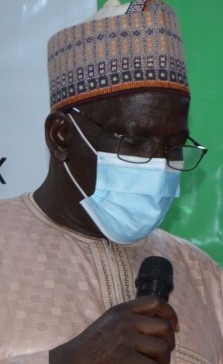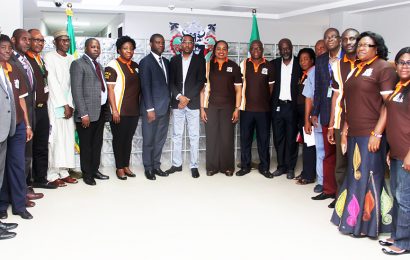
PROTOCOL
Director, Projects Coordinating Unit (PCU), Federal Ministry of Agriculture and Rural Development, Abuja.
Representatives of other Ministries/Agencies here present.
The Management Staff – APPEALS NCO
The State Project Coordinators [Cross River, Enugu, Kogi, Kaduna, Kano and Lagos State]
Programme Managers of Agricultural Development Programmes
Distinguished Guest Consultants & Resource Persons
Small and Large Scale Farmers Representatives
Non Governmental Organizations (NGOs)
Distinguished Colleagues
Gentlemen of the press
Ladies and Gentlemen
I am highly delighted to be part of you in this unique occasion of the Project Facilitators Training Workshop of APPEALS Project. It is a great deal of personal joy for me to note that the genuine efforts to improve the agricultural sector for a better life for our farmers is being achieved at this time when the mantle of leadership by the grace of God is entrusted to us.
I want to make it known that my presence here today is not just for ceremonial reason of addressing you at this workshop, but pertinently to demonstrate my commitment to, and identify myself with the aspiration and objectives of APPEALS Project. I must commend the efforts of the management and staff of the project and that of the Federal Ministry of Agriculture and Rural Development (FMARD) and the States Ministries of Agriculture and Natural Resources towards improving our agricultural sector through the design and implementation of APPEALS project.
Today’s occasion marks another milestone in the genuine efforts and desire of the present administration to ensure the realization of the project development objectives.
Distinguished Ladies and Gentlemen, permit me to brief this gathering about the project in her quest to develop agriculture in the country.
APPEALS project is a 6-year project designed in line with the Agricultural Promotion Policy (APP) of the Federal Government. It intends to build on the legacy of the Agricultural Transformation Agenda (ATA), and plans to support policy trusts on food security, local production, job creation and economic diversification. The project is targeting 60,000 individuals as direct beneficiaries ie. 10,000 beneficiaries per state, and 300,000 farm household members as indirect beneficiaries. It is anticipated that 35 percent of direct beneficiaries (or 21,000 individuals) will be women and youth. The Project has eleven commodity value chains which include Rice, Cocoa, Poultry, Cashew, Maize, Ginger, Diary, Wheat, Tomato, Cassava and Aquaculture. These priority value chains were carefully selected due to their potential in contributing to the government stated priority goals of (i) Food Security and local Production, (ii) Potential for exports, and (iii) contribution to improvement of livelihoods, and speedy income generation including jobs creation along the value chains.
Presently, the project is being implemented in these six states with their respective value chains.
Cross River – Rice, Cocoa, Poultry
Enugu – Rice, Cashew, Poultry
Kaduna – Maize, Ginger, Dairy
Kano – Rice, Wheat, Tomato
Kogi – Cassava, Cashew, Rice
Lagos – Rice, Aquaculture, Poultry
The project development objective is to enhance agricultural productivity of small and medium scale farmers and improve value addition along priority value chain in the participating states. The project was approved by the World Bank on March 23, 2017 and became disbursement effective on May 24, 2018. It is expected to close by September 2023.
Ladies and Gentlemen, I am pleased to inform you that the project has been making tremendous progress since its inception. It is worthy of note that despite the Covid-19 pandemic in the past 5 months which has led to restrictions in movement with resultant consequences to all sectors of the economy and particularly, agriculture the major employer of labour, it is on record that the overall performance of the project is satisfactory. The project has improved on its performance, across all participating states. A total of 277 VCIPs have been prepared, reviewed and approved for implementation by the beneficiaries. The project has also documented a total of fifty-five business alliances (off-takers/ out-growers) across nine (9No) value chains. In addition, a total of 64 different technologies have been demonstrated to farmers across the participating states. In keeping to and increasing this present pace, it has become imperative to conduct this very important training workshop for the project facilitators.
As you are aware, the facilitators are the front line officers when it comes to interfacing directly with the project beneficiaries, their roles and relevance to the realization of the project development objectives cannot be overemphasized. The workshop therefore has been carefully designed to achieve the following objectives:
Enhance facilitators understanding of the project strategy and components.
Elucidate on roles and responsibilities of each facilitators under the project.
Build capacities of facilitators on group formation, management and dynamics under the project.
Familiarize facilitators with the format for formulation of Value Chain Investment Plan (VCIP).
Enhance understanding of the procedure for the formulation of the VCIP.
Exposed potential project beneficiaries to project opportunities and eligibility criteria,
Expose CIGs, project beneficiaries to the strategy of organizing and preparation of a good quality sub-project.
Increase the level of participation of CIGs and project beneficiaries in decision making.
Promote managerial, administrative, financial and organizational capabilities of local service providers partnering with the project.
Equip participants with skills needed in using logical and analytical business principles in problem solving.
Stimulate local initiative that makes commercial farmers self- reliant in the final analysis to transit from small to medium scale commercial farmers and finally,
Develop the skills of participants in the formulation of business and sub project proposal and ranking.
Distinguished ladies and gentlemen, agriculture has remained a priority sector of the present administration of President Muhammadu Buhari. I therefore enjoin all the stakeholders in agriculture and particularly, the facilitators of the project to take full advantage of this workshop to move agriculture forward in our great nation. On behalf of the Hon. Minister of Agriculture and Rural Development, Alhaji Mohammed Sabo Nanono, the Permanent Secretary of the Federal Ministry of Agriculture, and the entire staff of this project, I now have the singular honour and privilege to declare this workshop open, to the glory of the Almighty Allah and agricultural development in Nigeria.
I wish you all successful deliberations at this very important workshop.
I sincerely thank you all for your attention and God Bless.






